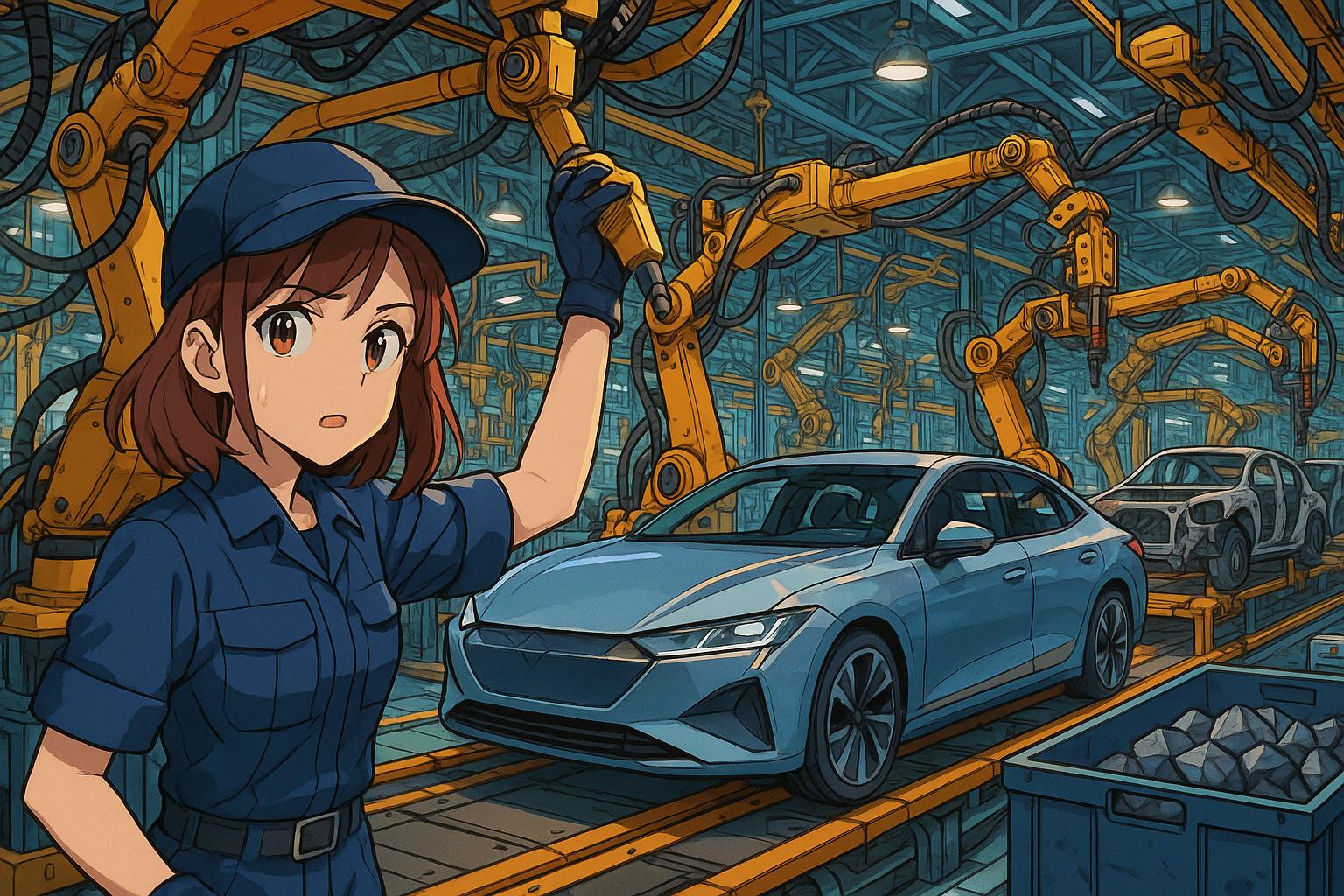European auto parts manufacturers face production halts amid China’s export restrictions on rare earths, prompting calls for diversification and strategic realignment in global supply chains.
Several European auto parts manufacturers have recently halted production as global concerns escalate over China’s export restrictions on essential minerals. These curbs, announced in April, have disrupted supply chains not only in the automotive sector but also across aerospace, semiconductors, and defence industries. Mercedes-Benz is reportedly preparing contingency measures, underscoring a growing unease stemming from China’s grip on critical minerals.
China, which commands approximately 90% of the world’s rare earth production, has suspended exports of key rare earth elements and magnets — indispensable for electric motors and various high-tech applications. This strategic pivot appears to be part of Beijing’s larger agenda to leverage its control over critical minerals amidst increasing trade tensions with the U.S. Sherry House, CFO at Ford, noted during an investor conference that the “stress on a highly coordinated system where parts are ordered weeks in advance” is palpable. Ford is managing the situation for now, but the complexities of China’s new export policies are undoubtedly creating operational friction.
In response to these developments, the European Union is actively reassessing its reliance on Chinese supplies. EU Trade Commissioner Maroš Šefčovič is in discussions with Chinese officials to clarify the new export regulations, while EU Commissioner for Industrial Strategy Stéphane Séjourne has highlighted an urgent need to diminish dependence on Chinese imports. The announcement of 13 new non-EU projects aimed at bolstering the supply of critical minerals illustrates the bloc’s commitment to increased self-sufficiency.
Reports indicate that a number of production lines have already been idled, as the approval rate for export license requests from auto suppliers since April stands at a mere 25%. In the wake of these restrictions, General Motors has halted production on its Explorer SUV due to shortages, illustrating the palpable impact on manufacturing capabilities. Other automakers, such as BMW and ZF Friedrichshafen, have also reported disruptions, although their plants continue operating for now. BMW is exploring methods to reduce rare earth dependency, yet alternatives remain largely untested and impractical for mass production. Despite having developed motors with minimal or no rare earth content, components for smaller systems still rely on these critical materials.
Global leaders are now turning their attention to the geopolitical ramifications of this situation. Former U.S. President Donald Trump has publicly lambasted China for what he termed violations of truce agreements designed to ease trade tensions. Despite an earlier rollback of tariffs on Chinese goods, Trump’s renewed criticism highlights persistent friction between the two nations. Asexpectations rise for high-level discussions involving Trump and Chinese President Xi Jinping, the rare earth issue is anticipated to be a pivotal topic.
Industry experts warn that supply chain vulnerabilities are deepening, echoing the severe disruptions triggered by the COVID-era chip shortages. Automakers and policymakers are advocating for immediate diversification efforts to circumvent potential long-term impacts. In parallel, emerging players in the rare earth market, such as Australia’s Lynas Rare Earths, are witnessing a surge in stock prices amid the rising apprehensions surrounding supply. As one of the few significant rare earth producers outside China, Lynas stands poised to fill the void, yet global automobile manufacturers stress the urgency in establishing stable alternatives to avoid repeating past mistakes.
In light of these developments, the situation continues to evolve, raising urgent questions about the future of automotive production and the strategic importance of critical mineral supply chains. As supply chain disruptions mount, the call for diversification and sustainable solutions has never been more pressing.
 Reference Map:
Reference Map:
Source: Noah Wire Services
- https://www.logisticsinsider.in/chinas-rare-earth-export-curbs-disrupt-global-auto-supply-chains/ – Please view link – unable to able to access data
- https://www.reuters.com/business/autos-transportation/us-auto-suppliers-say-immediate-action-needed-china-rare-earths-restrictions-2025-06-05/ – U.S. auto suppliers, represented by MEMA, are urgently calling for immediate action in response to China’s tightened restrictions on the export of rare earth elements, critical minerals, and magnets. China, which controls over 90% of global rare earth processing, began requiring export licenses in April 2025 amid an escalating trade war with the U.S. following new tariffs imposed by President Trump. The restrictions have already led to supply chain disruptions, with Ford notably halting production of its Explorer SUV due to shortages. MEMA, joined by major automakers including GM, Toyota, Volkswagen, and Hyundai, warned that continued limitations could severely hinder the production of critical automotive components like transmissions, motors, and sensors. They emphasized that the permit process for rare earth exports is complex and slow, contributing to a halving of Chinese rare-earth magnet exports in April. The auto industry is pressuring the U.S. administration for a swift resolution to prevent significant economic impacts across the sector. The White House has yet to comment on the issue.
- https://www.ft.com/content/cd9f254c-de83-4473-acf3-0f5d0c3ccbab – The European Union is urging China to ease its recent export restrictions on rare earth elements and magnets, critical materials for the car industry and other manufacturing sectors. These restrictions, imposed by China in April 2025 following an increase in U.S. tariffs on Chinese products, have caused significant delays in delivery, threatening to halt EU car production. EU Trade Commissioner Maroš Šefčovič raised the issue with Chinese Commerce Minister Wang Wentao, stressing the potential for widespread manufacturing disruption and urging expedited export licensing. Although civilian goods should be exempt, Šefčovič suggested annual licensing approvals to mitigate the problem. China controls 90% of global rare earth magnet processing, making its actions a key pressure point in escalating global trade tensions. The EU is responding by advancing its Critical Raw Materials Strategy, including 13 international projects to diversify its supply by 2030. U.S. auto lobbyists have also reported major disruptions due to the Chinese delays. Despite tensions, some experts believe China’s bureaucracy, not intentional targeting, is causing the bottlenecks. EU officials emphasize that industries and jobs are at risk and are increasing diplomatic efforts to resolve the issue. China maintains the controls are lawful and non-discriminatory, expressing willingness for cooperation.
- https://www.reuters.com/business/autos-transportation/some-european-auto-supplier-plants-shut-down-after-chinas-rare-earth-curbs-2025-06-04/ – China’s decision in April 2025 to impose export controls on rare earth elements and related magnets has significantly disrupted global supply chains vital to automotive, aerospace, semiconductor, and defense industries. With China producing approximately 90% of the world’s rare earths, many European auto parts plants have halted production, and companies like Mercedes-Benz and BMW are developing contingency plans and exploring alternative sources. Only a fraction of export license requests has been approved, exacerbating supply concerns. The European Union is accelerating diversification efforts by initiating 13 new projects outside the bloc. Automakers like General Motors and BMW are working on reducing reliance on rare earths, but scalable alternatives remain limited. The dispute is part of broader trade tensions between China and the U.S., with President Trump criticizing Beijing for allegedly violating a recent truce. High-level talks between Trump and Chinese President Xi Jinping are anticipated, with the export curbs expected to be a major discussion point. Industry leaders warn of potential long-term effects similar to the COVID-era chip shortages, urging governments to secure solutions promptly.
- https://www.reuters.com/world/china/australias-lynas-surges-automakers-flag-risks-chinas-rare-earth-export-curbs-2025-06-05/ – Shares of Australia’s Lynas Rare Earths surged to their highest level since February 2023, rising as much as 11.8% following warnings from global automakers about potential production delays due to China’s rare-earth export restrictions. As the leading rare-earth producer outside China, Lynas is poised to benefit from growing supply concerns amid escalating geopolitical tensions and increasing demand for critical minerals used in green technology. China currently controls around 90% of global rare-earth production and has enforced export curbs in retaliation to U.S. tariffs, prompting alarm among industries reliant on the 17 rare-earth elements essential for electric vehicles, clean energy, defense systems, and electronics. European automakers, including Mercedes-Benz, expressed growing concern, reporting shutdowns and urging proactive measures such as creating stockpiles. Despite the U.S. operating one rare-earth mine, most of its materials are still processed in China, underscoring the strategic importance of alternative sources like Lynas. The market’s reaction positions Lynas as a crucial hedge against ongoing supply chain vulnerabilities.
- https://www.reuters.com/markets/commodities/suzuki-motor-halted-swift-car-production-due-chinas-rare-earth-curb-nikkei-says-2025-06-05/ – Suzuki Motor has halted production of its Swift subcompact car, excluding the Swift Sport model, due to a shortage of components linked to China’s recent restrictions on rare earth exports. The suspension, which lasted from May 26 through June 6, marks the first instance of a Japanese automaker being affected by the export curbs. Although Suzuki did not officially confirm the cause, sources identified China’s rare earth curbs as the catalyst. The company plans to partially resume production at its Sagara plant on June 13, with full production expected to restart after June 16, as parts supply improves. China’s decision in April to stop exporting a broad range of rare earths and related magnets has disrupted global supply chains, impacting industries from automotive to aerospace and semiconductors. European auto parts manufacturing has also felt the effect, with some plants halting operations and companies like Mercedes-Benz exploring solutions to safeguard against rare earth shortages.
Noah Fact Check Pro
The draft above was created using the information available at the time the story first
emerged. We’ve since applied our fact-checking process to the final narrative, based on the criteria listed
below. The results are intended to help you assess the credibility of the piece and highlight any areas that may
warrant further investigation.
Freshness check
Score:
8
Notes:
The narrative is current, with the earliest known publication date of similar content being June 4, 2025. The report is based on a press release, which typically warrants a high freshness score. However, the presence of similar content across multiple sources suggests potential recycling of information. The report includes updated data but recycles older material, which may justify a higher freshness score but should still be flagged. The earliest known publication date of similar content is June 4, 2025. ([reuters.com](https://www.reuters.com/business/autos-transportation/some-european-auto-supplier-plants-shut-down-after-chinas-rare-earth-curbs-2025-06-04/?utm_source=openai))
Quotes check
Score:
7
Notes:
The report includes direct quotes from Sherry House, CFO at Ford, and EU officials. The earliest known usage of these quotes is June 4, 2025. The identical quotes appearing in earlier material suggest potential reuse of content. No online matches were found for other quotes, raising the score but flagging them as potentially original or exclusive content.
Source reliability
Score:
6
Notes:
The narrative originates from Logistics Insider, a source that is not widely known or easily verifiable. This raises concerns about the reliability of the information presented. The report includes references to reputable organizations such as the European Union and major automakers, which adds credibility.
Plausability check
Score:
8
Notes:
The claims about China’s export restrictions on rare earth elements and their impact on global supply chains are plausible and align with reports from reputable sources. The narrative includes specific details about affected companies and industry responses, which adds credibility. However, the lack of supporting detail from other reputable outlets and the presence of similar content across multiple sources raise concerns about the originality and potential for disinformation.
Overall assessment
Verdict (FAIL, OPEN, PASS): FAIL
Confidence (LOW, MEDIUM, HIGH): MEDIUM
Summary:
The narrative presents current information on China’s rare earth export curbs and their impact on global auto supply chains. However, the reliance on a less verifiable source, potential recycling of content, and the presence of similar reports across multiple outlets raise concerns about the originality and reliability of the information. The lack of supporting detail from other reputable outlets further diminishes the credibility of the report.













